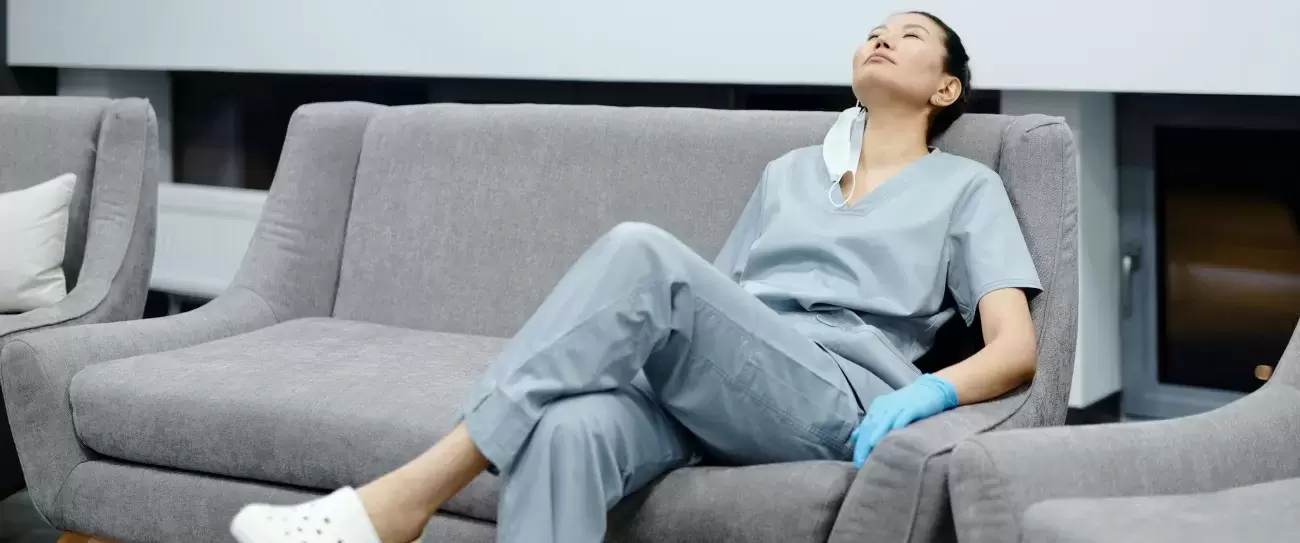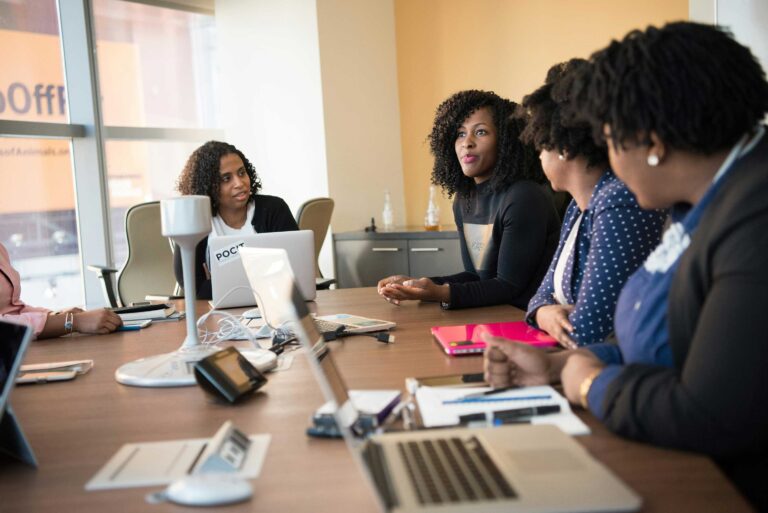
Sleep is critical for our overall physical and mental wellbeing but getting enough high-quality rest isn’t always easy. If you’re a healthcare worker, you may not be able to implement many basic sleep hygiene recommendations due to shift work, high stress, or other crucial responsibilities.
MHA talked to sleep health expert Dr. Ari Shechter, Assistant Professor of Medical Sciences at Columbia University Medical Center, about the importance of sleep and how healthcare workers can get the benefits they need from it.
Why is sleep important, especially for healthcare workers, and especially right now?
“Sleep plays an essential role in helping to regulate a huge variety of physical and mental processes. We know sleep impacts everything from cardiovascular health and metabolism to our immune response and risk for cancer. Sleep is directly implicated in regulating our mood states and is strongly related to mental health overall. Disturbances in sleep contribute to impairments in cognitive function, and recent work is showing links to neurodegenerative diseases and dementia. Simply put, we need sleep in order to survive and prosper.
“We know that even under routine conditions, irrespective of COVID, the psychological and physiological toll of clinical work can be substantial. All the challenges that healthcare workers routinely face are being magnified by the COVID-19 pandemic. In our own research, we observed that during the peak of COVID-19 cases in New York in April 2020, healthcare workers were experiencing high levels of psychological symptoms with 57% of participants screening positive for acute stress, 48% for depressive symptoms, and 33% for anxiety symptoms. Sleep duration, on average, was about 5.9 hours per day, which is typically not enough for an adult. Over 70% of healthcare workers in the study reported insomnia symptoms. These findings alone are sobering. But we also know that sleep disturbance and psychological distress in healthcare workers can have downstream adverse impacts on their risk of having diabetes, heart disease, or a stroke – this is something we are conducting research on right now to examine and that the community should address.”
“So, sleep is important for our mental health, our physical health, and cognitive functioning. But importantly, sleep is also involved in our immune system. Experimental work has shown that sleep disruption can increase risk for viral infection and impair immune responses. There is also evidence that immune responses could be further compromised by a disruption to our circadian rhythms that occurs because of shift work, so there could be increased vulnerability to COVID infection.”
“The hope is that by highlighting some of the ways that sleep disturbances can impact mental and physical health, we can raise awareness of how healthcare worker wellness is being adversely affected by this pandemic. With that, we can promote wellness and protection for these individuals who have given so much to ensure our safety and health.”
What are the detriments of insufficient sleep? Can it impact a healthcare worker's job performance?
“When looking at performance in particular, insufficient sleep is strongly related to cognitive functioning, which can obviously have an impact for healthcare workers. On the most basic level, insufficient sleep or poor sleep quality can cause daytime sleepiness and feelings of fatigue. Sleep disturbances cause reductions in alertness and vigilance, a slowing of reaction time, and impair our ability to maintain focus. [These effects can be a matter of life or death when it comes to patient care.] There is an often-cited study where participants were tested on a hand-eye coordination performance task under conditions of sleep deprivation and while consuming progressive amounts of alcohol. In that study, after being awake for 24 continuous hours, cognitive performance was decreased to a level that was equivalent to performance seen when participants’ blood alcohol concentration was at the legal level of intoxication. We see many of these effects in the laboratory under acute sleep deprivation conditions, for example, when participants are kept awake all night. But importantly, we also see these detrimental effects when participants undergo a more chronic sleep restriction that limits sleep time to 5 or so hours a night, which is more closely aligned with what is experienced by healthcare workers under real-life conditions. Decision-making and judgment are also impaired. Another aspect that can likely impact healthcare workers on the job is mood and emotional processing – sleep loss can cause us to have enhanced reactivity to negative emotions, such as anger and fear, and reduced reactivity to positive stimuli. Sleep loss is also linked to lower reports of self-esteem, empathy towards others, interpersonal functioning, stress management and coping skills.”
There is sometimes anxiety associated with going to sleep when it feels like there is always more to get done. Is it worth it to leave your to-do list unfinished in favor of getting enough sleep?
“Anxiety about sleep and during the period surrounding sleep is a huge issue, since being in a state of stress can make it difficult to fall asleep. You also run the risk of becoming conditioned to associate a state of anxiety/stress with trying to fall asleep or your sleep environment/bed, and this can contribute to insomnia. Replaying past situations and worrying about upcoming obligations or tasks can interfere with our ability to fall asleep. There is some evidence that mindfulness-based practices like meditation can improve sleep since they can help with relaxation and reduce obsessive thoughts and worry. It is important to try and wind down before going to bed.”
“There was an interesting recent study that asked participants to spend 5 minutes before going to sleep to write down all the tasks they needed to remember to do in the next few days. They found that writing this pre-bedtime “to-do list” helped participants fall asleep faster than a control condition where participants wrote out a list of things they had done in the previous few days. The researchers concluded that the act of writing down the tasks, as opposed to only thinking about them mentally, allowed the participants to experience less worry about their unfinished tasks. Doing this is a pretty low burden, low-risk approach that people can try if concerned with their unfinished business from the day.”
How can people combat that anxiety or guilt they feel about prioritizing sleep?
“I think recognizing the important role that sleep plays for our physical and mental health and well-being, our cognitive performance, and also for our immune function, can be a good motivator to try and prioritize sleep in our lives. I also think that – putting aside all the data and research – acknowledging the simple fact that people just feel better after good, sound sleep can help us to not feel so guilty about prioritizing it.”
What's more important: sleep quality or quantity?
“The question of whether sleep quality or quantity is more important is a tricky one. Historically, we have considered sleep quality and duration as factors that are distinct from each other – because of this, there is more evidence linking sleep duration with physical health outcomes, while linking sleep quality with psychological outcomes. But there is evidence for the reverse as well – there’s a strong link between insomnia/poor sleep quality with cardio-metabolic outcomes and a link between short sleep duration and mental health. So, it is ideal to try and promote sufficient sleep duration and sleep that is good quality because the whole of sleep is needed for our overall wellness.”
“The consensus from the major sleep medicine and research organizations is to obtain 7-9 hours of sleep per day for optimal health. However, there are individual differences in sleep need. Not everyone responds to sleep loss in the same ways – some will have minorly impaired cognitive performance after sleep deprivation, while others may be severely impaired. We also see individual differences in impairment after night shift work. Essentially, if you are experiencing sleep that is satisfying and you are waking up refreshed and experiencing adequate mental focus, performance, and mood during the daytime, you are likely getting sleep that is good for you.”
How can healthcare workers ensure they are getting not only enough sleep, but high-quality sleep?
“Keeping a regular schedule of sleep timing is something that can likely help to improve or maintain good sleep quality and duration. But of course, this may not be an option for many healthcare workers given the current situation. Some other things that can be done to help achieve good duration and quality sleep is to create a sleep-promoting environment. Things like keeping the room dark, at a comfortable temperature, quiet, and free of interruptions are helpful. Black out curtains or an eye mask can help, especially if sleeping during the daytime because of working night shifts. White noise machines seem to help some people with reducing interruptions, but there isn’t a lot of clear evidence for their effectiveness. Earplugs can also help with keeping the environment quiet.”
“Something that I think is pretty unique to our present time and current climate is how electronics play into our pre-bedtime routines. Exposing yourself to personal light-emitting devices like smartphones and tablets while in bed and trying to get to sleep can be disruptive because they emit high amounts of short-wavelength light (so-called “blue light”) which we know can cause neuro-cognitive arousal and also reduce melatonin secretion (a hormone that helps us fall asleep and stay asleep). But beyond this, and I think more importantly, is using electronics to do things like doom-scrolling through Twitter, reading news online, checking social media which can be inciting and activating, and the like. Exposing ourselves to primarily bad news of the day, about the spread of the virus, infection and death rates, etc., on top of everything going on politically, can increase anxiety, stress, worry, fear, sadness, and even activate us physiologically, causing increases in heart rate and blood pressure. This can impede our efforts to fall asleep and stay sleeping soundly. A recommendation I would make is to try and avoid engaging with online activities which you know can be activating or anxiety-provoking for a period of time before going to sleep, and especially while in bed. Try to avoid checking your phone for emails and news in the middle of the night, even if you wake up briefly. I realize it might be easier said than done, but if you are experiencing sleep difficulties and you do engage in these kinds of practices, it is one of the first things I would try. In general, it is ideal to reserve the hour or 30 minutes before going to sleep for relaxation and enjoyable activities that aren’t on screens – like reading, listening to music, or journaling – to prepare your body and brain to enter into sleep.”
“The good news is that both sleep quality and duration appear to be improving in some healthcare workers since the worst of the COVID-19 surge back in April in New York. We have some very preliminary findings from our study where we asked questions about sleep every 2 weeks for the 3 months after the initial surge period in our New York City healthcare workers. Across that follow-up period, during which time case rates and hospital crowding were steadily declining, sleep duration on average increased and the proportion of participants reporting insomnia symptoms also steadily decreased. However, sleep did not improve uniformly in everyone. Insomnia symptoms worsened across the follow-up in some healthcare workers. We have to explore this further, but it could be related to some sustained psychological distress persisting after the surge period. For instance, we know from prior infectious disease outbreaks similar to COVID-19 that some frontline healthcare workers unfortunately develop post-traumatic stress disorder (PTSD), and sleep disturbance is very common within those individuals. There really is a strong need to continue to study mental health and sleep within healthcare workers during and after COVID to recognize and address these factors.”
Are there any benefits to "sleeping in" when you can? Is it possible to make up for lost sleep?
“In general, yes there is benefit to ‘sleeping in’ after a period of lost sleep. The human sleep-wake system is regulated in part via a homeostatic process, meaning there is a balance between being awake and asleep that our body and brain tries to maintain. Because of this homeostasis, or regulated balance, when we stay awake for an extended period of time we have an increase in the drive to fall asleep and stay asleep. If you deprive someone of sleep, once they are able to sleep the body and brain compensate for this with a sleep episode that is longer in duration and characterized by more intense sleep (sleep that is deeper and more restorative). This is probably not surprising to anyone who has had an extended period of long shifts and short sleep. The data show that many of the negative impacts on cognitive performance, vigilance, and mood that arise because of sleep restriction are improved after a period of recovery sleep (i.e., ‘sleeping in’ to make up for lost sleep). There is also an interesting idea that ‘banking sleep’ might be a useful approach to mitigate some of the effects of short-term sleep restriction (like an abnormally busy week) or shift work on things like cognitive performance and fatigue. The idea is that by extending sleep duration prior to a period of sleep restriction (or shift work), the negative effects of the subsequent sleep disturbance will be reduced. There is some evidence that this approach is in fact beneficial.”
Bottom line: sleeping in once in a while isn’t the same as consistently good sleep habits, but it does have benefits.
What can healthcare workers do if they're unable to get regular sleep due to shift work, changing schedules, increased hours, or otherwise?
“This is an important issue, because as much as we say people should prioritize their sleep duration and quality, we know that sometimes the circumstances make it very difficult to do so. This is particularly true for healthcare workers and even more so during a global pandemic that is unprecedented in our lifetimes. Carving out and reserving specified times for sleep and protecting sleep via the safeguards mentioned above when a sleep opportunity is available are important. It is also advisable to try to get sleep when the opportunity arises. This can definitely include taking naps. So-called ‘prophylactic naps’ before and during night shifts can be an effective countermeasure for sleepiness and performance impairments while working.”
What about parents who typically sleep during the day, but are now tending to children who are remote learning?
“We are collecting data on how the home environment, and childcare needs in particular, are impacting mental health and sleep in healthcare workers during COVID times. These really are unprecedented times and the demands on healthcare workers with family obligations, such as young children who are at home, is another huge challenge.”
 Dr. Ari Shechter is Assistant Professor of Medical Sciences at Columbia University Medical Center. Dr. Shechter received his PhD in neuroscience at McGill University, with a focus on human chronobiology. He then completed a postdoctoral research fellowship at the New York Obesity Nutrition Research Center at Columbia University. Dr. Shechter conducts laboratory-based experiments, observational studies, and clinical interventions to understand the biobehavioral pathways by which sleep and circadian rhythms influence health.
Dr. Ari Shechter is Assistant Professor of Medical Sciences at Columbia University Medical Center. Dr. Shechter received his PhD in neuroscience at McGill University, with a focus on human chronobiology. He then completed a postdoctoral research fellowship at the New York Obesity Nutrition Research Center at Columbia University. Dr. Shechter conducts laboratory-based experiments, observational studies, and clinical interventions to understand the biobehavioral pathways by which sleep and circadian rhythms influence health.
Related articles
 If you’re working on improving your sleep but still find yourself struggling, you might be showing the early warning signs of a mental health or substance use condition. Visit mhascreening.org to take an anonymous, free, and private mental health test. It only takes a few minutes, and after you are finished, you will be given information about the next steps you should take based on the results.
If you’re working on improving your sleep but still find yourself struggling, you might be showing the early warning signs of a mental health or substance use condition. Visit mhascreening.org to take an anonymous, free, and private mental health test. It only takes a few minutes, and after you are finished, you will be given information about the next steps you should take based on the results.
If you or someone you know is struggling or in crisis, help is available. Call or text 988 or chat 988lifeline.org. You can also reach Crisis Text Line by texting HELLO to 741741.
